School of Design, Summer School Seminars
The summer seminar is a feature of the international master's degree programs of the School of Design, Shanghai Jiao Tong University, which aims to enlarge students’global horizons, and cross-cultural and cross-disciplinary research competence. This summer, two modules will be provided: interdisciplinary course and elective courses. The interdisciplinary course "Society and Design" is open to all M.Arch, IIDE, and M.La students,and to be delivered by Professor Ruan Xing, Dean of the School of Design. Elective courses are offered independently by three departments. Internationally renowned academics are invited to give a series of short-term lectures, bringing students to enter advanced topics and in-depth research. Students are free to choose the courses according to their interests. The course information is published as follows.
Interdisciplinary Course
Society and Design–A History of Housing
Class hours
Tuesday June 21st, 14:00-17:40
Thursday June 23rd, 14:00-17:40
Tuesday June 28th, 14:00-17:40
Thursday June 30th, 14:00-17:40
Tuesday July 5th, 14:00-17:40
Thursday July 7th, 14:00-17:40
Tuesday July 12th, 14:00-17:40
Thursday July 14th, 14:00-17:40
Description
Rich housing types embody all manner of forms, customs and styles, which vary in cultures in pre-modern times, and are likely to vary even in individuals in our time. But when viewed as a formal configuration, beyond shapes and dimensions, housing throughout human history, surprisingly, can be classified into a few patterns. They include, specifically, the courtyard pattern, the inter-connected room matrix pattern, and the pattern of terminal rooms opening to a common corridor. This course examines the human relations that are not only cemented but also animated through the human occupation of these patterns and, thereby, fosters an understanding of modern housing and society against such historical background.
This course introduces to students various interpretive and analytical approaches drawn from the humanist tradition and historical studies, as well as nineteenth-century development of the Ecole des Beaux-Arts and modern anthropology, which will enable them to gain an overview of housing history in both Europe and Asia from antiquity to the present. By offering focused and in-depth studies of selected themes and cases in housing history, this course enables students to gain an architectural understanding of society and design.
About the Professor
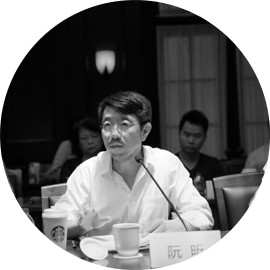
RUAN Xing
PhD, Dean and Guangqi Chair Professor of Architecture at School ofDesign,
Shanghai Jiao Tong University
He is a member of Shanghai Jiao Tong University Academic Committee. RUAN Xing joined Sydney’s University of New South Wales (UNSW) as Professor of Architecture in 2004. He was Associate Dean at the Faculty of the Built Environment (2015-2018), Director of Architecture (2014-16), Chair of Architecture Discipline and Director of Master of Architecture from (2005-09). Prior to his appointment to UNSW, he was Head of School of Architecture at the University of Technology Sydney (2002-04). In 2019, he was the curator of Shanghai Urban Space Art Season biennale.
RUAN Xing’s scholarly interests lie in the study of physical laws of architectural forms, comparative study of Western and East Asia’s architectural history, a cultural history of housing, housing design and way of living, vernacular architecture and cultural anthropology, architectural education, resilient architecture and design approach, urban renewal, and the study of Asia’s architecture and urbanization against the background of Western discourse. The titles of his books include: Confucius’Courtyard (Bloomsbury, 2022); Fusheng Jianzhu [ Floating Life and Architecture 浮生·建筑] (The Commercial Press, 2020); Allegorical Architecture, (University of Hawai’i Press, 2006); New China Architecture (Periplus, 2006); Hand and Mind (UNSW Press, 2018); Topophilia and Topophobia, (Routledge 2007). His books have received critical acclaim and enthusiastic appraisal both in academic journals and from some mainstream media outlets around the world.
RUAN Xing has published in leading academic and literary journals, such as JSAH (Journal of the Society of Architectural Historians), Jianzhu xuebao [Architectural Journal 建筑学报], Jianzhu shi [The Architect 建筑师] and Wenhui Xueren of Wenhui Ribao [Wenhui Scholar of Wenhui Daily 文汇学人, 文汇日报]. RUAN Xing has co-edited, with Ronald Knapp, of the book series Spatial Habitus: Making and Meaning in Asia’s Architecture published by the University of Hawai’i Press, with published titles encompassing buildings in China, Japan, Korea, India and the Middle East. He has also contributed, as a critic, to professional architecture journals in Australia and China.
RUAN Xing teaches architectural design, history and theory. He has been invited to give keynote and public lectures at conferences and universities in China, South-East Asia, India, USA, the UK, Italy, New Zealand, Argentina and Australia. He also serves as a supervisor for PhD and Master’s research degrees.
-1655710581774.jpg)
The atrium in the House of Menander, Pompeii, drawn by RUAN Xing.
-1655710597608.jpg)
Plans of the Western Zhou courtyard and the Ming-Qing Beijing quadrangle juxtaposed, drawn by RUAN Xing.

The featured courtyard in Can Lis with opening in the encircling wall enclosure, drawn by RUAN Xing.
Elective Courses
Department of Architecture
Architecture and Urban Form in Paris, from Haussmann to Macron

Monday July 4th,7-10th classes
Wednesday July 6th,7-10th classes
Monday July 11th,7-10th classes
Wednesday July 13th,7-10th classes
Description
Course Description: Modern Paris is enchanting. If we could magically travel to the Paris of the 1920s, we would witness “the moveable feast” characterized by Ernest Hemingway, and be amazed by the density of the creativity there. At this moment, in cafes by the left bank of Seine, all types of avant-gardists were gathering: writers Heiminway, James Joyce, and Erza Pound, painters Pablo Picasso, Joan Miró, and Piet Mondrian, fashion designers Coco Chanel and Jeanne Lanvin, architects Le Corbusier and Theo van Doesburg, and, of course, many, many others from various intellectual circles. Their brilliant thoughts and distinctive perspectives informed their works which, in turn, have fundamentally shaped the modern world — the very world we are now living in.
Famously considered as the “Capital of the 19th Century” by Walter Benjamin, Paris could be considered by 1900 a “finished” city, i.e. a complete and completed work of art. Yet, strategies of structural and aesthetic modernization proposed since the 1880s have profoundly shaped the city’s shape and Parisian visual culture. The course is devoted to the documentation and interpretation of schemes and projects conceived since 1871 for the city’s expansion, for its internal transformation, at the crossroads between politics, technology, architecture, and art. The response of artists, photographers, film directors, and intellectuals, to transformations imagined by visionaries such as Eugène Hénard, Louis Bonnier, Henri Sauvage, Marcel Lods, Claude Parent or Yona Friedman is considered, in parallel to the analysis of more than fifteen decades of overlooked but fascinating projects.
About the Professor
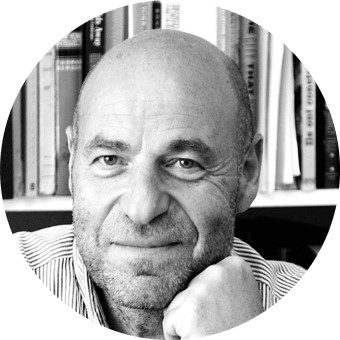
Jean-Louis Cohen
Sheldon H Solow Professor in the History of Architecture, Institute of Fine Arts, New York University
Jean-Louis Cohen is a distinguished architectural historian and architect. His research interests focus on architecture and urban planning in Europe, Russia, North-America and North Africa from 1900 to the present. He authored over forty books in many countries and in several languages, including Le Corbusier and the Mystique of USSR (1992), Mies van der Rohe (1994, revised in 2007, 2018), The Future of Architecture Since 1889 (2012), and Architecture in Uniform; Designing and Building for WWII (2011) which won the Grand Prix du livre of the Académie d’architecture, the Art Book Prize, and the Alice Davis Hitchcock Book Award of the Society of Architectural Historians.
Cohen has been a frequent jury member of architectural competitions and curated numerous key exhibitions for the Pompidou centre, the Canadian Centre for Architecture, the French Institute of Architecture, and the Museum of Modern Art (MoMA). Since 1994, he has served the Sheldon H Solow Professor in the History of Architecture at New York University’s Institute of Fine Arts.
About the Coordinator of the course
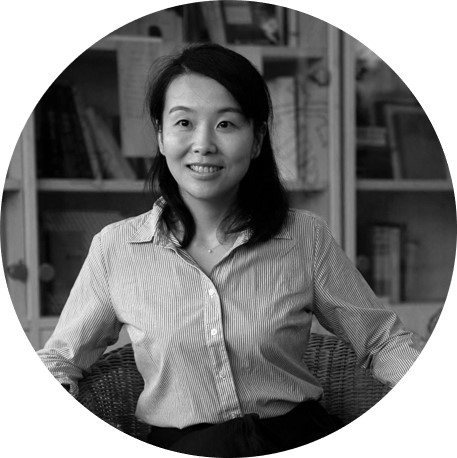
Xiangnan XIONG
Assistant Professor at Shanghai Jiao Tong University
She holds a Ph.D. degree of Architectural History and Theory from the University of Texas at Austin. Her primary research field is western modern architecture. She has published extensively in major academic journals and co-translated and co-edited books. Her monograph Mies at Home is published by Routledge in 2022.
Department of Design
IIDE symposium

1st July- 15th July, twice a week
Description
Design was traditionally associated with making visual artefacts and industrial products, but it has shifted towards creating intangible outcomes which focus on social, cultural, and business issues to facilitate large scale system level changes.
With the boundaries of design expanding to include many new territories, designers often find themselves called into projects that tackle our major challenges such as healthcare, wellbeing, sustainability, and digital transformation.
A new frontier of design practice has emerged and service design is one of these. This series of talks explore discourses in this field and showcase its application through most recent service design projects and funded research projects.
The course is consist of four sessions as below.
Session 1: Service Design in Practice
There is a rich picture of how designers operate in practice and contribute to wider and ongoing service development processes in different contexts. Following an introduction to service design, this session will include two service design projects to showcase the most contemporary applications of service design practice and thinking in addressing societal and environmental challenges we face.

Canal Dream, Little Venice, 2022
Session 2: Service Design Discourse and Its Future
This session focuses on an empirical study which examines the future relevance of service design practice through in-depth interviews with design professionals predominantly located in the UK. The findings show the diverse views towards how service design is applied in practice and how it is perceived as a discipline, suggesting that service design is not so much a unified practice as a range of practice used in diverse contexts.
Session 3: Service Design in Transdisciplinary Research
This session will offer key insights from two large research projects funded through the prestigious Arts and Humanities Research Council, UK: Nature’s Way and Connecting Roots. As a result of the COVID-19 pandemic, linkages between nature and health and wellbeing are recently rediscovered(reclaimed?) and widely promoted(studied?). There is ample evidence of wellbeing pathways linked to nature, and growing interest in supporting nature-based activities as a non-clinical intervention to support(maintain?) mental wellbeing and public health, and as valid options to enhance community wellbeing and social inclusion.
Session 4: From Service Design to Transformative Design
This session offers a review of the current projects delivered by service design agencies in attempt to understand the scale of the practice in creating transformative impact. InHouse Records (an early and fully functional record label to be launched in prison, created with and by prisoners) will be introduced to showcase how service design can create a transformative impact in one of the most challenging environments.


Community Gardens, Walsall, 2022
About the Professor

Dr. Qian SUN
Reader in Service Design, Policy and Social Innovation
at the Royal College of Art
Dr Sun’s research focus is on the use of design in trans-disciplinary innovation that addresses contemporary societal challenges in health and wellbeing, community resilience, and sustainability. She has a demonstrated record of producing high quality research outputs, securing research funding, establishing research partnerships in the UK and internationally. She is regularly invited to examine PhDs (not sure what it means ) and to review papers and proposals for conferences, journals, and funding. She is currently Principal Investigator for two AHRC funded projects “Connecting Roots: Co-creating a Green Social Prescribing Network in Walsall for Health and Wellbeing” and “Nature's Way: Co-Creating Methods for Innovating Nature-based Solutions for Public Health and Green Recovery in a Post-COVID World”.
About the Coordinator of the course

Liqun ZHANG
Associate Professor, PhD supervisor and Director of the Institute of Design Management of School of Design, Shanghai Jiao Tong University
His main research interests include computationally driven innovation systems, product innovation strategies, and design management for complex systems. He has long been engaged in research and practice on design management and strategy, digital transformation of design-oriented processes and design intelligence, and has established theoretical and technical system of generative design with high involvement of user; he has conducted systematic and in-depth research and practice in digital and intelligent upgrading of manufacturing innovation design and digital transformation of intangible cultural heritage. His monographs include Research on Design Management and Nature-inspired Design.
Department of Landscape Architecture
The Forefront of the Practical Means to Achieve Resilience against Climate Change
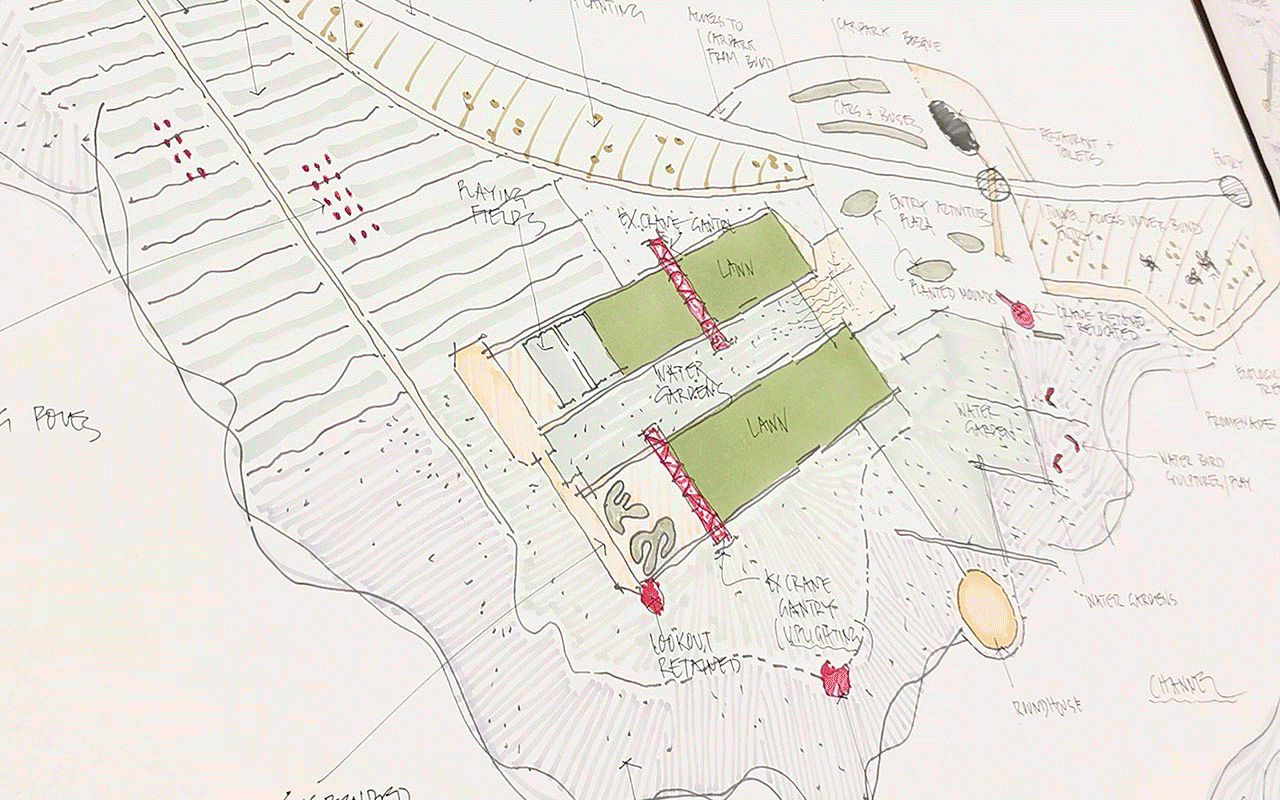
Wednesday June 22nd 6-9th classes (12:55-16:45pm)
Wednesday June 29th 6-9th classes (12:55-16:45pm)
Wednesday July 6th 6-9th classes (12:55-16:45pm)
Wednesday July 13th 6-9th classes (12:55-16:45pm)
Description
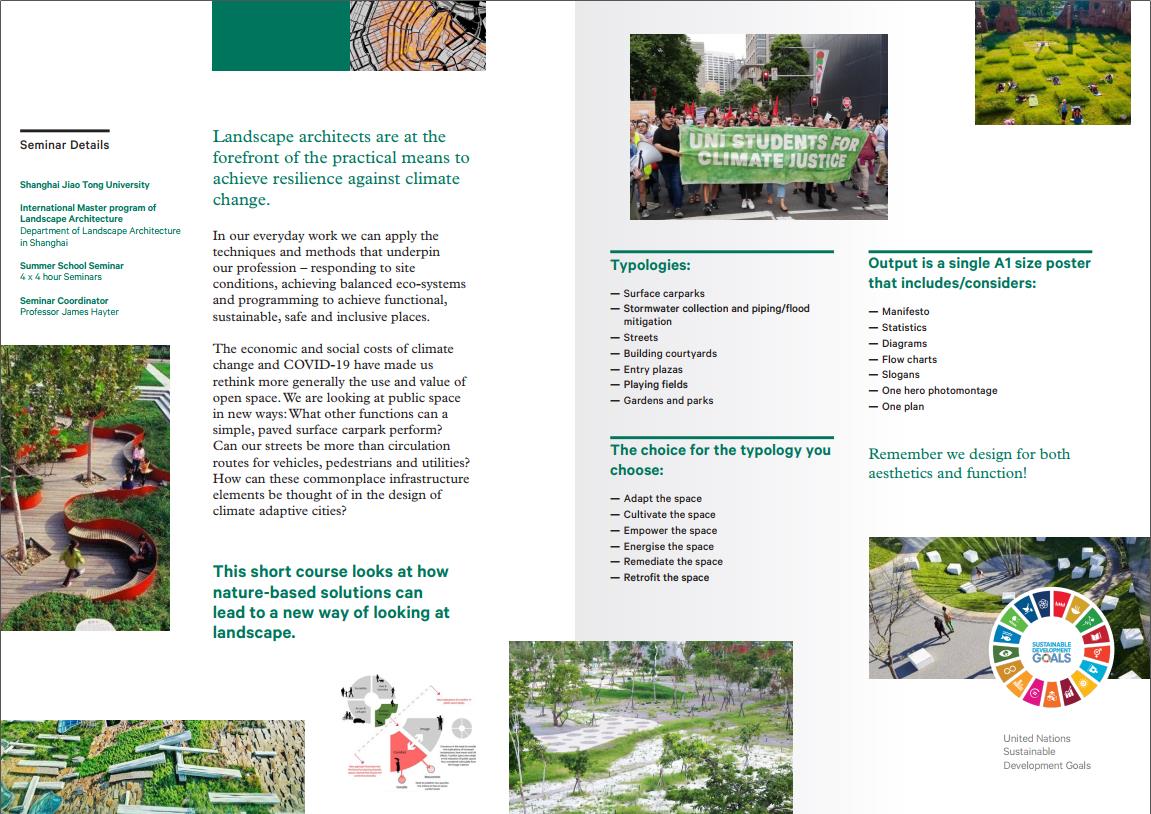
Landscape architects are at the forefront of the practical means to achieve resilience against climate change.
In our everyday work we can apply the techniques and methods that underpin our profession – responding to site conditions, achieving balanced eco-systems, and programming to achieve functional, sustainable, safe and inclusive places.
The economic and social costs of climate change and COVID-19 have made us rethink more generally the use and value of open space. We are looking at public space in new ways: What other functions can a simple, paved surface carpark perform? Can our streets be more than circulation routes for vehicles, pedestrians, and utilities? How can these commonplace infrastructure elements be thought of in the design of climate adaptive cities?
This short course looks at how nature-based solutions can lead to a new way of looking at landscape.
Typologies:
— Surface carparks — Stormwater collection and piping/flood mitigation — Streets — Building courtyards — Entry plazas — Playing fields — Gardens and parks
The choice for the typology you choose:
— Adapt the space — Cultivate the space — Empower the space — Energise the space — Remediate the space — Retrofit the space
Remember we design for both
aesthetics and function!
About the Professor

James Hayter
Landscape Architect, Urban Designer, Architect,Professor, University of Adelaide , and former President of IFLA
James Hayter,Landscape Architect, Urban Designer, Architect,Professor, University of Adelaide , and former President, International Federation of Landscape Architects.
James Hayter is regarded as one of Australia’s most respected design professionals in the fields of landscape architecture, architecture and urban design. His professional practice, Oxigen, completes approximately 100 projects each year, including award winning projects of national and international profile.
James Hayter has practiced his profession in the public, private and academic sectors, gaining the respect of his peers in each. James brings this broad understanding of the design profession and its requirements to the broader profession and industry, making him a valuable contributor towards the advancement of the design professions in Australia.
With over 35 years of professional experience, James has excellent strategic planning skills and an ability to conceptualize projects and requirements for implementation. He brings comprehensive technical skills including a desire to try innovative ways of resolving the requirements of a project and design skills proven through many projects with Oxigen and through his work in the UK and in the United States. James is appointed advisor to the State and National design advisory committees and is a visiting professor at a number of overseas universities.
About the Coordinator of the course

Liqing ZHU
Lecturer at School of Design, Shanghai Jiao Tong University.
His research interests include digital landscape and sustainable landscape design. He has published a monograph and edited a textbook entitled Preliminary Landscape Architecture Design. He has won five IFLA Awards of Excellence and Honors; and one BALI British National Landscape Award. He and his group received six awards for outstanding design and student design competitions from the Chinese Society of Landscape Architecture.
Based on the course information above, M.Arch, IIDE, and M.LA students who are interested in taking elective courses offered by other departments may contact the program director or the Office of Academic Affairs . The deadline for application is on 19th June 2022.